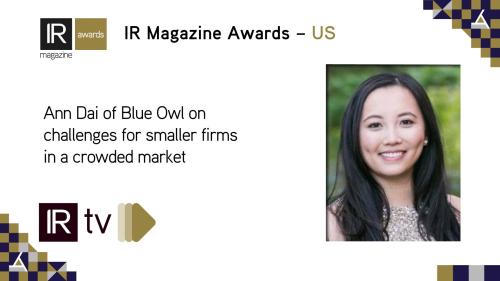Last month, IR Magazine hosted its fourth Small Cap Forum – an opportunity for small and micro-cap investor relations professionals to discuss the challenges and opportunities that are often unique, or more acute, at smaller companies. In this article, we summarize some of the key takeaways.
Don’t wait for analyst coverage
While many small and micro-cap companies don’t have significant analyst coverage due to the changing economics of investment banking and Mifid II’s unbundling of research and corporate access fees, that shouldn’t deter them from approaching respectable small-cap portfolio managers directly.
‘One of the biggest challenges if Wall Street doesn’t cover a company is that you have to do your own digging,’ said James Hasso, managing director and head of small-cap equities at Voya Investment Management.
The solution to helping fund managers like Hasso conduct their research is very much within the grasp of most IR teams. ‘One of the most important things for companies that have very little coverage is to really have a robust website with filings, news releases, press releases and presentations,’ Hasso said.
Beyond this, Hasso said sell-side analysts keep tabs on many companies they don’t have bandwidth to initiate coverage on. By having an up-to-date website, and adhering to IR best practices around visibility, communication and transparency, small caps can get on the radar of both the buy side and the sell side.
If you do have analyst coverage, learn how to leverage it
During the same panel discussion, Lucy Lu, principal for investor relations at Sixth Street Specialty Lending, talked about the importance of knowing how to leverage sell-side coverage when you get it. Sixth Street Specialty Lending currently has 10 covering analysts, and Lu said she has developed an understanding of what their strengths are. This is especially acute at small-cap companies, where investor relations is often run by one person, or sits within a broader finance department.
‘Our analysts all bring different expertise and viewpoints to the table,’ Lu said. ‘There’s no importance ranking but, as a team of one, there’s definitely different prioritization based on certain situations. For example, if there’s news in the market or there’s noise related to our earnings, I’ll try to first call the analysts I know are quick to publish. That way I can make sure they have an accurate interpretation of the news in the market and that nothing is lost in translation. But it’s something you feel out over time.’
‘You have to be agile’
When it comes to investor marketing, there is still a lot of uncertainty about how much activity will take place in person and virtually next year. Numerous speakers talked about the phenomenon of Zoom fatigue and the desire to get back to in-person meetings, but also acknowledged that there are risks – in terms of both health and resources – in overcommitting to in-person interactions.
‘You have to be agile,’ said James Siccardi, vice president of investor relations at Energy Recovery. ‘It’s a very fluid environment. We’ve had some conferences and non-deal roadshows that had been planned as live events but turned out to be virtual.’
While that can be frustrating, Siccardi added that ‘the nice thing is that with the investors and C-suite executives all in the same boat, everyone is allowing for changes at the last minute.’
Meanwhile, Jason Fooks, senior vice president of investor relations and marketing at iStar and Safehold, said virtual meetings will definitely remain in his IR toolkit even after we’ve return en masse to in-person interactions.
‘This Zoom capability has unlocked a lot of really exciting potential for investor relations professionals in terms of what we can do and who we can bring in,’ he explained. ‘We’ve experimented a lot, learned a lot and, as we get back to a world where we’re in person, I think some of the things we’ve learned will stay in the toolkit.’
Understanding when to host an investor day
To that end, a number of speakers talked about how their companies were considering hosting an investor day next year, using virtual meeting technology to broadcast an entirely virtual or hybrid event. But Hunter Wells, vice president of investor relations at Century Communities, cautioned against holding an investor day unless the timing is right.
‘You want attendees to leave your event with a really clear understanding of where your company is today in terms of its strategic growth plan and what your top initiatives will be over the next several years,’ she said. ‘If your management team is not in a position to talk about its current future initiatives in detail, or perhaps you believe you could be entering a volatile or unpredictable period for the company, it’s likely not a good time to host an analyst day.’
US small caps could be in for a bumpy ride
While many US small caps have recovered from the Covid-19 market crash much faster than expected, the boomerang effect we’ve seen in the US equities markets has given some participants reason for caution. One such observer is Gervais Williams, head of equities at Premier Miton Investors, who explained why he’s less bullish on US small-cap equities at the moment.
‘One of the features of the US stock market is that many of the companies there are ambitious in terms of their growth, which often involves running business not necessarily for profit, but running down cash reserves,’ he said. ‘Those businesses do well when there’s plentiful support from the stock market. If we find the market is peaking, and worries about tapering and interest rate rises mean markets are less supportive, we might expect some of the US markets to be more vulnerable. Small companies, which may be short of cash, can find themselves quite vulnerable.’
For that reason, Williams said he is largely looking outside of the US market for small-cap investments at the moment, to track down companies that are well funded and not as reliant on funding from the stock market.











